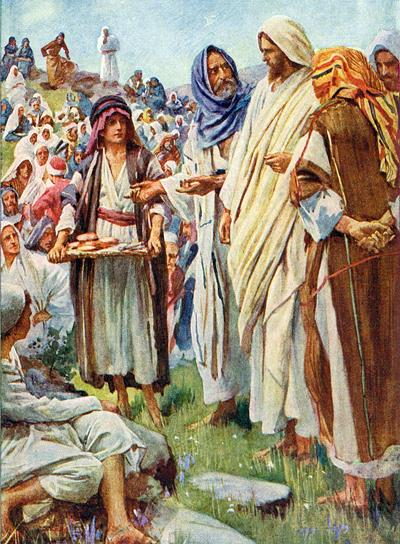The Lord’s Prayer
Give us our daily bread accroding to the day. —Luke 11:3
When we pray for daily bread, what does the Lord give us?
Exodus 16: 19-20. And Moses said to them, Let no one make a residue of it until the morning. And they hearkened not to Moses; and some men made a remainder of it until the morning, and it bred worms and stank, and Moses was enraged with them.
Matthew 6:31-34. Be not therefore anxious, saying, what shall we eat? or, what shall we drink? or, with what shall we be arrayed? For all these things do the nations seek; for your Heavenly Father knows that you need all these things. But seek ye first the kingdom of God, and His justice, and all these things shall be added to you. Therefore do not be anxious for tomorrow; for tomorrow shall be anxious for the things of itself. Sufficient for the day is the evil of it.
AC 8478. As in this and the following verses in the internal sense care for the morrow is treated of, and as this care is not only forbidden, but is also condemned (that it is forbidden is signified by that they were not to make a residue of the manna till the morning, and that it is condemned is signified by that the worm was bred in the residue, and it stank), he who looks at the subject no deeper than from the sense of the letter may believe that all care for the morrow is to be cast aside, and thus that the necessities of life are to be awaited daily from heaven. But he who looks at the subject deeper than from the letter, as for instance he who looks at it from the internal sense, is able to know what is meant by “care for the morrow.” It does not mean the care of procuring for oneself food and raiment, and even resources for the time to come, for it is not contrary to order for anyone to be provident for himself and his own. But those have care for the morrow who are not content with their lot; who do not trust in the Divine, but in themselves; and who have regard for only worldly and earthly things, and not for heavenly things. With such there universally reigns solicitude about things to come, and a desire to possess all things and to dominate over all, which is kindled and grows according to the additions thus made, and finally does so beyond all measure. They grieve if they do not obtain the objects of their desire, and feel anguish at the loss of them; and they have no consolation, because of the anger they feel against the Divine, which they reject together with everything of faith, and curse themselves. Such are they who have care for the morrow.
Very different is the case with those who trust in the Divine. These, notwithstanding they have care for the morrow, still have it not, because they do not think of the morrow with solicitude, still less with anxiety. Unruffled is their spirit whether they obtain the objects of their desire, or not; and they do not grieve over the loss of them, being content with their lot. If they become rich, they do not set their hearts on riches; if they are raised to honors, they do not regard themselves as more worthy than others; if they become poor, they are not made sad; if their circumstances are mean, they are not dejected. They know that for those who trust in the Divine all things advance toward a happy state to eternity, and that whatever befalls them in time is still conducive thereto.
Be it known that the Divine Providence is universal, that is, in things the most minute; and that they who are in the stream of Providence are all the time carried along toward everything that is happy, whatever may be the appearance of the means; and that those are in the stream of Providence who put their trust in the Divine and attribute all things to Him.
Questions and Comments
- What is the difference between prudently planning for the future and trying to collect more than the day’s worth of manna?
- What does it mean in AC 8474 when it says that those who trust in the Divine have care for the morrow, but still have it not?
- What does it mean in 8474 to be content with our lot? Are we content with our lot? If so why? And if not, why not?
- When we experience anxieties about future events or worries about something we know we will have to deal with, does it help to say just this portion of the Lord’s Prayer?
| previous |  |
next |
|---|


